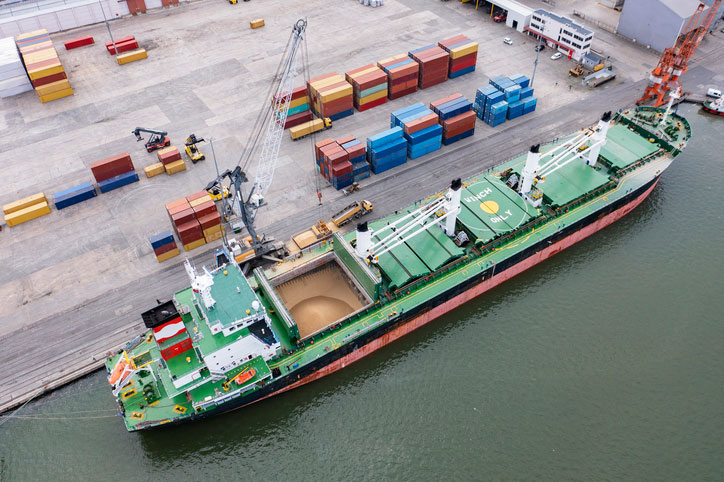Written by Scott Wilson

Logistics and supply chain management jobs are eternal. Organizations of any kind — and that includes government agencies and non-profits — will always need to get the stuff they need to make products or accomplish missions. Whether it’s a locally-sourced small-town restaurant, or a global player in high-technology, someone has to identify the sources, negotiate the deals, and get things from point A to point B and beyond.
Modern executives know what General Bradley knew… and what Caesar, Napoleon, and others before him knew: the best laid plans are nothing without the resources to accomplish them.
Not only are there a lot of supply chain management jobs: they exist for a vast array of specializations.
Different layers of technical know-how and industry experience distinguish the many different supply chain management jobs from one another. And you can make an entire career in the field in any of those specialized roles.
When you look at both the demands of and the demand for supply chain managers at every level, it becomes clear you’re looking at a field where education is key. In a field where job descriptions can vary by industry and specialization, it takes a solid understanding of the various roles to start laying plans for the kind of degree you’ll need for the job you want. That’s exactly what this guide is here to provide.
Quartz from the mountains of Appalachia is crushed into sand and shipped to China where it is processed into silicon ingots. From there it is sent to Japan to be turned into blank semiconductor wafers before being sent to Taiwan, etched, and made into processor chips. Those chips then go back to China where they are finally assembled with a set of other components, each with their own lengthy journeys, to become a shiny new iPhone. That market-ready product is then packaged, assigned an inventory ID, and shipped back across the Pacific to a West Coast seaport, placed in the back of an eighteen-wheeler and delivered to a warehouse at a regional shipping hub. When an order comes in and its number is up, it’s finally delivered to a customer’s doorstep, contributing a drop to the revenue stream worth roughly $50 billion a year to Apple, Inc. This is logistics and supply chain management in action.
Managing the Material Needs of Modern Industry and Society

In many ways, supply chain management jobs keep our modern world ticking.
Take a look around right now. Every item in your field of vision that was bought from a store, delivered by Amazon, or sent through the Post Office is only there because of a working supply chain. The electricity that is powering your computer, the gas that heated water for your morning coffee, even the internet service that is bringing these bits to your web browser right now – at some step in the process, they all rely on efficient and timely supply chain management.
In the midst of the COVID-19 pandemic and afterward, we all got a taste of what it’s like when the supply chain starts to falter. But thanks to dedicated supply chain management professionals, it has been reforged.
The lessons that supply chain management professionals took from those events continue to be of critical importance – to you, to industry, to hospitals, to government.
And supply chain management jobs are a way for you to get in on that exciting and important role.
There’s No Such Thing as a Typical Supply Chain Manager Job Description

Get things where they need to be on time and in good condition; and do it at the lowest possible cost.
That’s it. That’s what it always comes down to.
It turns out there are a lot of different steps and niche specializations that make that all happen, though. Every industry relies on supply chain managers, but every industry is different. And those industries come with different considerations when it comes to everything from environmental impacts and regulations to geopolitics and technology.
Figuring out your niche in this broad field is step one in determining the degree you’ll need to earn.
The Six Primary Categories of Supply Chain Management Jobs
There’s a lot involved in the processes by which a commodity is produced and distributed. So much, in fact, that most people don’t even realize everything taking place behind the curtain to make it all happen. In fact, you could slip about any job in a modern organization onto the list and find some way that it is part of the chain of processes used to produce products and bring them to market.
But in the business world, supply chain management is universally understood to be the actual planning and processes that move, produce, and distribute goods.
That’s still a huge scope. But you will commonly find people breaking it down into six or so functions. Although there are many sub-specializations in the field, they will fall into one of these larger categories.

Job titles in this category include:
- Forecasting and Planning Manager
- Supply Chain Analyst
With a central role in costs and revenue generation, the supply chain is a major target for companies trying to develop a competitive advantage. Since technology and markets shift so quickly, just keeping up can require constant analysis. Actually getting ahead takes deep strategic thinking using the latest data and ideas.
Particularly at large organizations, there are plenty of dedicated supply chain management professionals working on those hard problems. Analysts make use of ERP (Enterprise Resource Planning) software and machine learning to process big data and glean trends in supply needs and processes. They become adept at modeling various strategies and changes to make the most of the information. And they predict additional changes in the supply chain so corporate managers can get ahead of the curve.
At higher levels, supply chain managers in this area develop strategic plans around the supply chain. They also frequently participate in larger corporate planning. They may be a key resource for senior executives to tap as they chart the course for the entire company.

Job titles in this category include:
- Buyer/Purchasing Agent
- Contract Manager
- Strategic Sourcing Manager
Whether it’s the raw materials used to craft new products or finished parts for critical machinery, every organization is in the market for supplies from other organizations. Sometimes that includes services, like shipping or maintenance. In any case, someone has to evaluate the options, negotiate the best deals, and administer the contracts that execute them.
That’s the role of procurement in supply chain management. Supply chain managers in this field have their finger on the pulse of markets. They are masters of negotiation and contract management. They always have alternatives in mind and can cut the best possible deals. They know how to evaluate potential sources for stability, reliability, and quality.

Job titles in this category include:
- Product and Operations Manager
- Production Master Scheduler
- Operations Manager
The supply chain doesn’t stop when incoming goods reach the warehouse and then magically turn into finished products for distribution. Overseeing the day-to-day workflow of production within the company is just as much a part of managing the supply chain.
This is operations management, where supply chain processes function internally to process materials into final products. A supply chain manager in these roles is the linchpin that ties procurement and distribution together. They have to ensure enough materials are coming in at the right time to produce the right number of products the market demands.

Job titles in this category include:
- Inventory Manager
- Inventory Analyst
Keeping track of all the parts and products a company has control over at any given moment is no joke. At Boeing, a major aerospace manufacturer, for example, more than three million individual parts are received every day from more than five thousand suppliers. The system that lets production managers find, use, and re-stock them must be tuned to near perfection.
In fact, it’s a critical specialty in supply chain management. These professionals are responsible for building and managing inventory systems. Using software and other high-tech tools like wireless tracking tags, blockchain-based delivery, and augmented reality, inventory managers ensure stock remains visible and accounted for throughout the supply chain.

Job titles in this category include:
- Warehouse Manager
- Supply Chain Logistics Manager
- Director of Supply Chain Materials Management
All that inventory, both parts and finished goods, must go somewhere. That creates its own specialization, in storage and warehousing.
Many a supply chain management career path starts off in a drafty warehouse. But storage is a supply chain management specialty because it’s often not as simple as tossing a sack of wrenches on a shelf somewhere. Modern goods often require advanced storage considerations for logistics teams—they may need to be kept within a tight temperature range, or have a certain amount of airflow, or need key weight-bearing supports.

Job titles in this category include:
- Delivery Manager
- Local Planner
Moving items around is an inherent part of the supply chain. Whether it’s across oceans or ten feet across a factory floor, any supply chain grinds to a halt without transportation.
Supply chain managers must balance efficiency with reliability in this field. Fraught with environmental and other hazards, transportation is an area where backup plans and risk management are key. At the same time, the expense of transport makes this a focus for optimization. So, teams are constantly evaluating the most cost-effective option that can get the job done. They work closely with logistics, analysts, inventory, and storage teams to balance the flow through and around the organization.
There are often roles that cross over among these categories, too. There’s no hard and fast rule that every operations and supply chain management job must fit some theoretical system. Companies go for what works. When that means integrating inventory and storage management, that’s the job that will result. If transportation fits best with operations, then that’s what will happen.
Employers are Hiring for SCM Jobs of the Future Today
 Blockchain-based tracking and fulfillment contracts. High-speed drone delivery. AI-enabled production forecasting. Autonomous eighteen-wheelers. Sail-powered cargo ships.
Blockchain-based tracking and fulfillment contracts. High-speed drone delivery. AI-enabled production forecasting. Autonomous eighteen-wheelers. Sail-powered cargo ships.
The supply chain changes constantly. The entry level supply chain management jobs of tomorrow may be in specializations that we can only guess at today. But even those guesses offer some spectacular thoughts on how the industry will evolve over your career.
RFID tags are already ubiquitous for tracking products moving through outsourced operations. That may be backed up tomorrow by self-executing, blockchain-based contracts, which validate processing and delivery and make payment automatically, without a human in the loop.
Amazon and other fulfillment operators are already beta testing drone delivery and autonomous vehicle operations. Soon, transportation managers may have to become programmers, with a fleet of robot drivers under them.
And the world of artificial intelligence is already shifting how analytics happen. When will computers start to watch social media trends and place new orders up and down the chain instantly as a product goes viral?
Innovation has always been part of supply chain management. When you become responsible for getting things done faster and cheaper, you may be the one inventing the next new specialty in supply chain management.
It’s also true that the smaller the organization, the more hats a supply chain manager will have to wear. So, a supply chain management job description for a small regional hardware store chain might simply say all-of-the-above, a national chain will have hundreds of people splitting up the roles.
And when companies face supply chain challenges too tough for their own teams, they pick up the phone to call business management consultants with supply chain expertise. As niche experts for any industry or aspect of logistics, supply chain management consultants need more education and more experience than the average supply chain professional.
Across Specializations, Leadership Skills are Key to Being an Effective Supply Chain Manager

Supply chain management takes place within and above these functional silos. That means there are more general supply chain management roles, such as Global Supply Manager, Program Manager, or Senior Supply Chain Manager, that involve tying together all aspects of the supply chain. Naturally, these tend to be more senior roles requiring more education and experience.
And at the very top levels, you will find Chief Supply Chain Officers (CSCO) or Vice Presidents of Supply Chain Management calling the shots for the entire organization.
Supply chain leaders must understand all the elements of the chain and develop big-picture strategies that consider them. Their roles incorporate a little bit of each specialization. But they also need more generalized business and management skills. They coordinate with other departments and functions inside and outside the business.
That can involve mastery of concepts in accounting and economics, marketing and sales, and even politics and international relations. Their concerns will go beyond the supply chain itself and right to the heart of the business.
Salary Levels for the Big Supply Chain Management Job Classifications

The Bureau of Labor Statistics is the government agency that keeps track of salary levels for defined roles in the American workforce.
They offer two categories that can give you a ballpark idea of what sort of salaries a supply chain management career can deliver for you.
Supply chain management salary levels can be found in two different primary classifications:
- Logisticians - These are the analysts and coordinators who do the day-to-day work of keeping the supply chain on track. Their roles require a great deal of specialized knowledge, but only rarely management or supervisory duties.
- Transportation, Storage, and Distribution Managers - The actual management roles in SCM are filled by individuals in this category. They are responsible for orchestrating teams in every function of supply chain management.
Finally, there’s a third level of supply chain management job, but one that doesn’t line up quite as neatly with the field. That’s the BLS job classification for Top Executives. These most senior players in any organization are responsible for making high-level strategic decisions and leading entire departments. But BLS doesn’t categorize them exclusively within the supply chain world; there are plenty of high-level accountants, marketing officers, and other executives who are included in that matrix.
Average salaries for these job categories reflect their relative level of responsibility and the greater level of education and skill they require:
- Logisticians - $77,520
- Transportation, Storage, and Distribution Managers - $98,560
- Top Executives - $98,980
Of course, the top executive role includes an average that is drawn from a far broader field. It’s reasonable to imagine that supply chain expertise in that role will tend to put salaries in the above-average range. BLS pegs the top ten percent of that category as making over $208,000 per year.
The Education You Need for the Supply Chain Management Job You Want
As you would expect, different types of supply chain management jobs with varying levels of responsibility each require their own unique kinds of educational qualification. But all of them start with some sort of degree in logistics and supply chain management.
Those degrees come at every available level.
Entry level supply chain management jobs may only require an Associate in Supply Chain Management, whether an AS, AA, AAS. With two years of training that combines logistics, operations, and general studies courses, you will pick up enough to get off to a good start in hands-on positions in the field.
For genuine management responsibility, the minimum requirement is usually a Bachelor of Supply Chain Management. At four years, BA, BS, and BBA programs offer more preparation than an associate program. In fact, many associate degrees can be used as transfer degrees that will account for about half your bachelor’s studies. But with more liberal arts education and more intensive supply chain studies, these degrees set you on a path toward more lucrative positions with more room for advancement.
Senior management positions in logistics may require a Master of Supply Chain Management, or even an MBA in Supply Chain Management. Taking between one and three years to complete, these programs offer high-level and intensive studies of supply chain principles and practices. Each involves some original research and innovative thinking. The MBA is traditionally more big-picture, business-oriented, while an MS in SCM offers in-depth explorations of supply chain specializations. But either one can signal to employers that you are fit for high-level jobs in the field.

It’s more ambiguous where you might end up with the highest levels of education in the field. Those come through a Doctor of Business Administration (DBA) in Supply Chain Management or a Doctor of Philosophy (PhD) in Supply Chain Management. These programs can last anywhere from three to five years and go to the very boundaries of supply chain knowledge and theory. But that theoretical and research-based study is often more suited to academic jobs. A DBA is more business-oriented, but still pretty unique, even among the most senior executives.
Finally, Certificate in Supply Chain Management programs offer a faster, less-expensive way to brush up on your essential knowledge and skills. They are most often offered as add-on options that you can earn alongside a bachelor’s in business or other major, or as a graduate certificate (post-bachelor’s) for professionals working in fields that intersect with SCM. These condensed programs typically come in two different flavors:
- A comprehensive, general overview aimed at leaders who are taking on some supply chain responsibilities while coming from outside the field
- Technical, highly-focused, niche training in a particular supply chain specialization aimed at individuals already working in SCM
Either one can be a good fit for your career, but it’s important to learn the details before signing up!
The Skills and Knowledge for Jobs at Every Level of the Supply Chain Come with the Right Degree

At every level of education, supply chain management programs offer the specialized knowledge you need to understand and work within the field. That means coursework covering the basics:
- Procurement
- Forecasting and Analytics
- Logistics and Storage
- Risk Management
- Transportation Systems
- Automation and Tracking
The kind of detail and the specific skills you learn in those classes will vary according to your degree level. In an associate’s program, for instance, you’ll get a lot of on-the-ground knowledge about transfer, storage, and handling of goods. A master’s student, on the other hand, will look more at the systems surrounding those functions, as well as analytics and assessment.
High-level supply chain management degrees also spend more time on management itself. Business administration skills like accounting, communication, and project management are all important parts of these programs.
Finally, you’re likely to get at least a little bit of hands-on experience in a degree program. Whether through an internship or a cooperative consulting project with outside businesses, you’ll get the opportunity to see how real lessons are applied in the supply chain world.
Degree Concentrations in Supply Chain Management Prepare You for Specialization in the Field

This curriculum pattern shifts with different concentration options in supply chain management. These can be the options that really focus your studies on a particular niche in the field. If you have a solid idea of which category of supply chain management you want to pursue as a career, this is where you start pushing in that direction.
Concentrations deliver a more focused study on specific parts of the supply chain field. So, you can explore logistics, procurement, or transportation at a higher level of detail that will better prepare you for work in those areas.
There’s also a special angle that comes with an MBA in Supply Chain Management. The overall focus of those programs will be on administration and leadership skills, applied in the unique world of supply chain management.
The Right School Can Make Your Supply Chain Management Job Goals Easier to Achieve
Schools all over the country support your path to supply chain management careers by offering degrees in the field. But you’ll do yourself a favor by looking carefully at both the quality and the connections of those schools before you pursue a degree at any level.
Because of the considerable differences between industries and specialties, where you learn your trade has real implications for your career. Instructors who have close ties to the pharmaceutical industry and direct knowledge of fast-paced air freight shipments that keep it humming might not have a lot to contribute if your career goal is to get into international automotive fulfillment.
To build your network and get the latest, most relevant information, you’ll want to make sure the school you pick aligns closely with the industry you want to work in. Naturally, you’ll also want the kind of individual attention and support that any college student deserves.
Supply Chain Management Degrees Online Can Help You Keep Your Current Job While Moving Toward the Next One

Online supply chain management degree programs can be an advantage no matter what kind of job you are pursuing. It allows you to choose from among schools that specialize in your field and industry even if they are halfway across the country.
Even more importantly, online studies are a key factor when you already have a supply chain management position but need a different degree to advance your career. Rather than putting the job on hold, and missing out on critical experience and opportunities, choosing an online program lets you keep your nose to the grindstone while you put your brain into high gear.
Many of the same technologies behind remote learning are used in supply chain management itself, from teleconferencing to Slack channels. You’ll have no trouble adapting. And you’ll develop additional comfort and expertise with the next generation of software tools along the way.
Industry Certifications Can Give Your Supply Chain Management Career a Shot in the Arm

Separate from the idea of a supply chain management academic certificate is professional industry certification in the field. A certificate program gives you an education. A certification proves that you know what to do with it.
Supply chain management industry certification is an independent third-party process that verifies your knowledge and skills in a particular area of supply chain management. Often, these align with the major specializations in the field, like purchasing or risk management. But they can also be even more niche, like validating your ability to work with a certain piece of software.
On the other end, they can go big and broad, testing your overview of supply chain management as a whole.
Clearly, all these options are aimed at different kinds of roles and levels of responsibility.
Professional certification in supply chain management can be the deciding factor for employers looking to select the most qualified candidate from a large pool of talent.
For senior managers and executives coming in from outside the field, certifications are a way to develop and test your knowledge for roles that take on elements of supply chain management. They give you a little bit of street cred in a field where expertise is crucial.
For supply chain managers down in the trenches, certifications are a way to work your way into high-paying niche positions where extra expertise is needed. They help you stand out against the crowd and offer employers some assurance that you have precisely the skills they need.
To do all this, certifications usually put together elements of training, testing, and verification of on-the-job experience. Various certs have different reputations and uses in the field—you’ll need to explore the common ones in your niche.
The sheer variety of jobs in logistics and operations means there’s something for just about everyone. From supply chain management entry level jobs in delivery or warehousing in your neighborhood all the way up to global supply chain management jobs that send you overseas, there’s going to be something that matches your interests and abilities.
It’s demanding work. But it offers both great job satisfaction and solid paychecks.
2022 US Bureau of Labor Statistics salary and employment figures for Top Executives, Logisticians, and Transportation, Storage, and Distribution Managers reflect national data, not school-specific information. Conditions in your area may vary. Data accessed July 2023.







